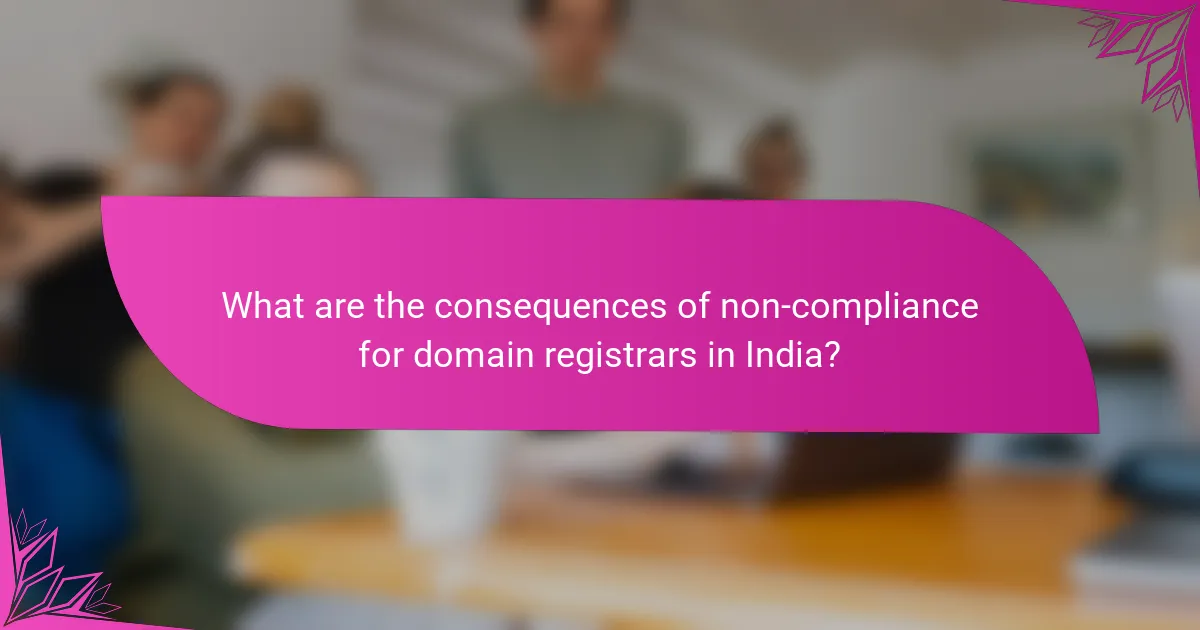Domain registrars in India are required to comply with specific local regulations to ensure legal and effective operations. Key requirements include obtaining ICANN accreditation, adhering to data protection laws, fulfilling tax obligations, and following consumer protection regulations. Maintaining compliance through regular audits and ongoing education is crucial for safeguarding both the registrar’s operations and customer trust.

What are the local compliance requirements for domain registrars in India?
Domain registrars in India must adhere to specific local compliance requirements to operate legally and effectively. These include obtaining ICANN accreditation, adhering to registrar agreements, following data protection regulations, fulfilling tax obligations, and complying with consumer protection laws.
ICANN accreditation
To register domains, registrars in India must obtain accreditation from the Internet Corporation for Assigned Names and Numbers (ICANN). This process involves meeting certain technical and financial criteria, which ensures that registrars can manage domain registrations responsibly.
ICANN-accredited registrars must maintain a high level of service and comply with global standards, including providing accurate WHOIS information and ensuring domain security. Failure to comply can lead to loss of accreditation.
Registrar agreements
Registrars must enter into agreements with ICANN and other relevant authorities, which outline their responsibilities and obligations. These agreements typically cover aspects such as pricing, domain transfer processes, and dispute resolution mechanisms.
It is crucial for registrars to thoroughly review these agreements to understand their legal commitments and ensure compliance with all terms to avoid penalties or legal issues.
Data protection regulations
In India, domain registrars must comply with data protection regulations, particularly the Information Technology Act and the Personal Data Protection Bill. These laws mandate that registrars protect personal data collected during the registration process.
Registrars should implement robust data security measures and ensure that they have clear privacy policies in place. Non-compliance can result in significant fines and damage to reputation.
Tax obligations
Domain registrars in India are subject to various tax obligations, including Goods and Services Tax (GST) on services provided. Registrars must register for GST if their turnover exceeds the prescribed threshold and file regular returns.
Understanding tax liabilities is essential for financial planning and compliance. Registrars should consult with tax professionals to ensure they meet all requirements and avoid penalties.
Consumer protection laws
Registrars must comply with consumer protection laws in India, which safeguard the rights of consumers in online transactions. This includes providing clear information about services, pricing, and terms of service.
Registrars should establish transparent communication channels for customer support and dispute resolution. Adhering to these laws not only fosters trust but also helps avoid legal repercussions.

How to ensure compliance as a domain registrar in India?
To ensure compliance as a domain registrar in India, it is essential to adhere to local regulations, conduct regular audits, and engage in ongoing education. This approach helps maintain legal standards and protects both the registrar and its customers.
Regular audits
Regular audits are crucial for domain registrars to assess compliance with Indian regulations and internal policies. These audits should be conducted at least annually and can include reviews of customer data handling, financial practices, and adherence to the Information Technology Act.
Consider engaging third-party auditors for an unbiased evaluation. This can help identify potential compliance gaps and ensure that corrective actions are implemented promptly.
Legal consultations
Engaging in legal consultations is vital for domain registrars to navigate the complex regulatory landscape in India. Regular meetings with legal experts can provide insights into changes in laws and regulations that impact domain registration practices.
Establishing a relationship with a law firm specializing in technology and internet law can be beneficial. They can assist in drafting terms of service, privacy policies, and ensuring compliance with the Reserve Bank of India’s guidelines on financial transactions.
Compliance training programs
Implementing compliance training programs for staff is essential to foster a culture of adherence to regulations. These programs should cover topics such as data protection, customer rights, and the legal responsibilities of domain registrars in India.
Consider conducting these training sessions quarterly and updating the content regularly to reflect any changes in legislation. This proactive approach helps mitigate risks and ensures that all employees are well-informed about compliance requirements.

What are the consequences of non-compliance for domain registrars in India?
Non-compliance for domain registrars in India can lead to significant repercussions, including financial penalties, loss of accreditation, and potential legal actions. These consequences can severely impact a registrar’s ability to operate and maintain customer trust.
Fines and penalties
Domain registrars in India may face fines and penalties imposed by regulatory bodies for failing to adhere to compliance requirements. These fines can vary widely, often ranging from thousands to millions of Indian Rupees, depending on the severity of the violation.
It’s crucial for registrars to stay informed about the latest regulations and ensure compliance to avoid these financial repercussions. Regular audits and compliance checks can help mitigate risks associated with non-compliance.
Loss of accreditation
Failure to comply with local regulations can result in the loss of accreditation from governing bodies, such as the Internet Corporation for Assigned Names and Numbers (ICANN) or the National Internet Exchange of India (NIXI). This loss can prevent registrars from offering domain registration services altogether.
To maintain accreditation, registrars must adhere to strict guidelines and demonstrate ongoing compliance. Engaging in proactive compliance measures can help safeguard their accreditation status.
Legal actions
Non-compliance can expose domain registrars to legal actions from both regulatory authorities and customers. This could include lawsuits for damages or penalties for violating consumer protection laws.
Registrars should implement robust compliance programs and legal consultations to navigate the complexities of regulations and minimize the risk of legal disputes. Regular training for staff on compliance matters is also advisable to ensure everyone understands their responsibilities.

What best practices should domain registrars follow for compliance?
Domain registrars in India should adhere to best practices that ensure compliance with local regulations and enhance customer trust. Key practices include implementing robust security measures, maintaining accurate records, and staying updated with regulatory changes.
Implementing robust security measures
To protect customer data and maintain compliance, domain registrars must implement strong security protocols. This includes using encryption for data transmission, regular security audits, and multi-factor authentication for account access.
Additionally, registrars should educate their staff about cybersecurity threats and best practices. Regular training sessions can help in identifying potential vulnerabilities and responding effectively to security incidents.
Maintaining accurate records
Accurate record-keeping is essential for compliance with regulations like the Information Technology Act in India. Registrars should maintain detailed logs of domain registrations, customer information, and transaction histories.
Implementing a reliable database management system can streamline this process. Regular audits of records can help ensure that all information is current and compliant with legal requirements.
Staying updated with regulatory changes
Regulatory landscapes can change frequently, so domain registrars must stay informed about new laws and guidelines. Subscribing to industry newsletters and participating in relevant forums can provide valuable insights into upcoming changes.
Establishing a compliance team dedicated to monitoring regulations can also be beneficial. This team should regularly review policies and procedures to ensure alignment with the latest legal requirements in India.

How do local laws affect domain registration in India?
Local laws significantly influence domain registration in India by establishing compliance requirements that registrars must follow. These regulations ensure consumer protection, data privacy, and adherence to national security standards.
Impact on pricing structures
Local compliance requirements can affect the pricing structures of domain registration services in India. Registrars may need to incorporate costs related to regulatory compliance, such as fees for maintaining data security and privacy measures.
For instance, the implementation of the Information Technology Act and associated regulations may lead to increased operational costs, which can be passed on to customers. As a result, domain registration prices may vary, typically ranging from INR 500 to INR 2,000 per year, depending on the domain extension and registrar.
Additionally, registrars may offer different pricing tiers based on compliance levels. For example, premium domains or those with enhanced security features might come at a higher price point, reflecting the additional compliance efforts required.
